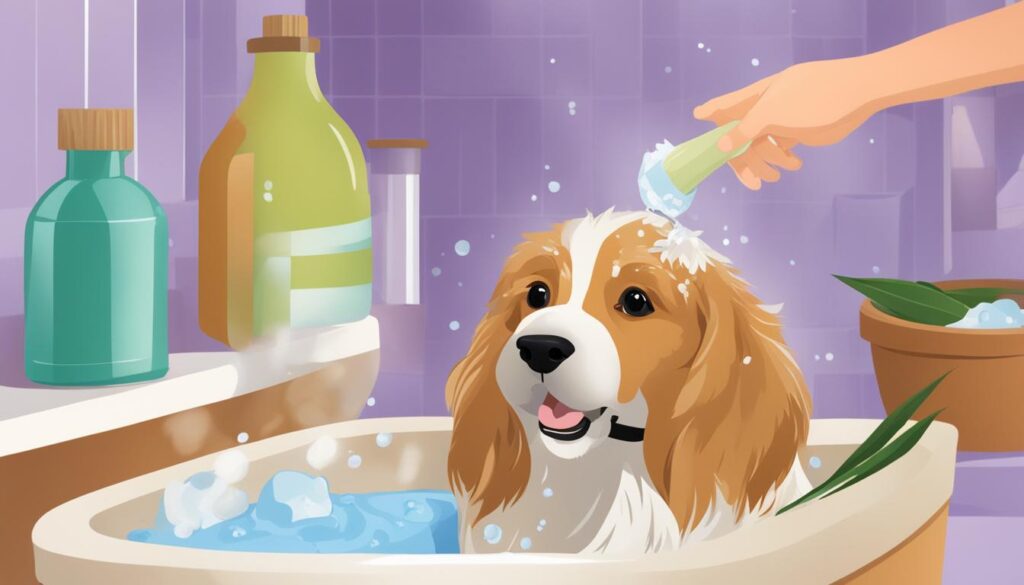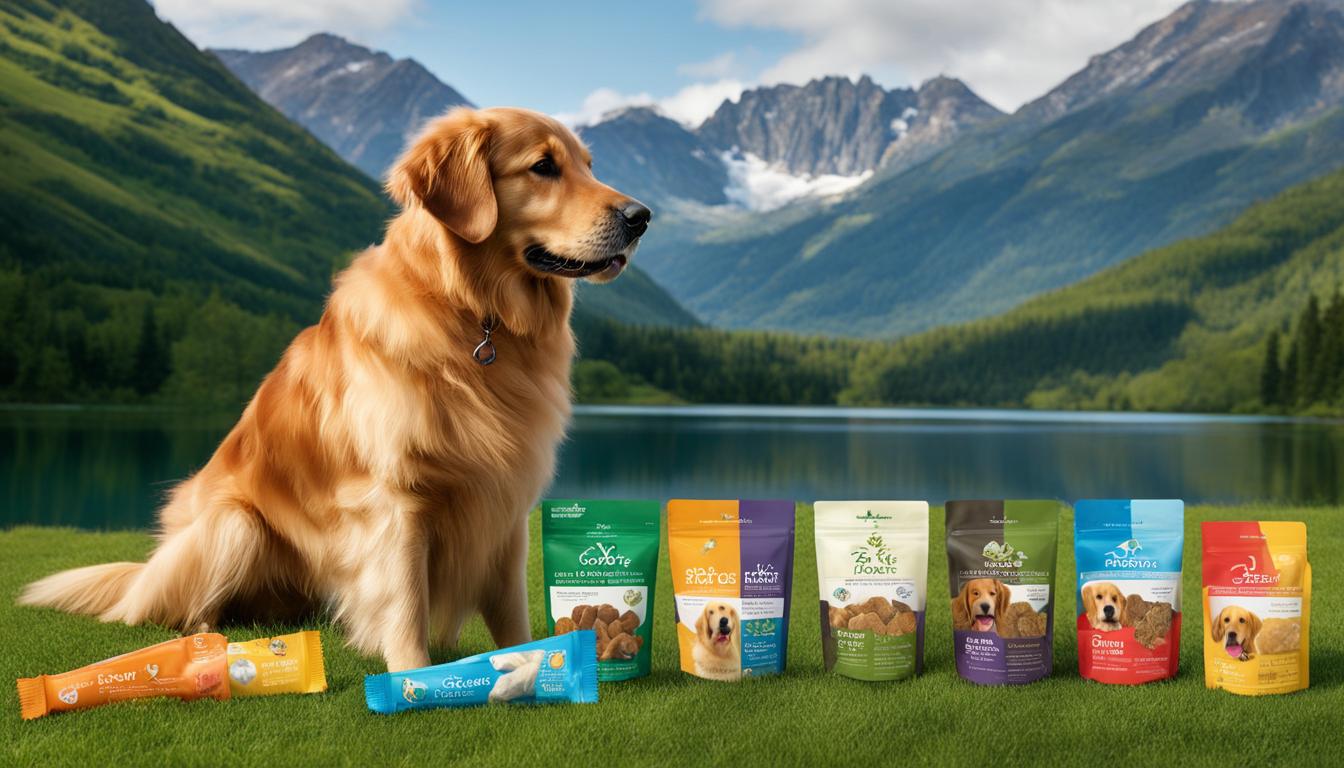Are you looking for natural remedies to keep your dog’s coat and skin healthy? Look no further! Throughout history, dog owners have relied on ancient treatments and remedies to address various coat and skin issues in their furry friends. These time-honored solutions have been passed down through generations and have proven effective in maintaining a healthy and shiny coat for dogs. Let’s dive into some of these historical dog coat remedies and natural remedies for dog skin issues.
Key Takeaways:
- Proper bathing and grooming are essential for a healthy dog coat.
- Feeding a wholesome diet can improve a dog’s ability to fight off allergies.
- Apple cider vinegar offers multiple benefits for dogs with skin issues.
- Managing heat and moisture is crucial for maintaining healthy skin.
- Calendula and omega-3 fatty acids supplementation can improve skin and coat health.
The Importance of Proper Bathing & Grooming
Proper bathing and grooming play a crucial role in maintaining the overall health and well-being of your furry friend. Not only does it keep their coat clean and shiny, but it also helps alleviate a wide range of skin issues. By following a few simple guidelines, you can ensure that your dog stays comfortable and free from skin irritations.
When it comes to bathing, frequency is key. While some dogs may require more frequent baths due to their activities or skin conditions, generally bathing your dog once every two to three months is sufficient. However, if your dog suffers from environmental allergies, more frequent bathing can provide relief. Use shampoos specifically formulated with soothing ingredients like oatmeal to help calm the skin and alleviate itching.
Regular brushing and combing should also be incorporated into your dog’s grooming routine. This will not only remove any dirt, debris, and loose hair but also stimulate the production of natural oils that keep the skin and coat healthy. Additionally, brushing helps distribute these oils from the root to the tip of each hair, resulting in a lustrous and shiny coat.
The Benefits of Proper Bathing & Grooming:
- Relieves itchiness and discomfort caused by allergies
- Removes dirt, debris, and loose hair
- Stimulates the production of natural oils for a healthy coat
- Prevents matting and tangling of the fur
- Promotes a shiny and lustrous coat
Proper bathing and grooming are not only essential for your dog’s appearance but also for their overall health and comfort. By incorporating these practices into their routine, you can help prevent and alleviate various skin issues, keeping your furry friend happy and healthy.

| Bathing Tips | Grooming Tips |
|---|---|
| Use lukewarm water to avoid drying out the skin | Choose brushes and combs suitable for your dog’s coat type |
| Thoroughly rinse off all shampoo residue | Start grooming sessions when your dog is relaxed |
| Avoid getting water into your dog’s ears | Check for any signs of skin issues during grooming |
| Pat dry your dog’s coat with a towel | Trim your dog’s nails regularly to prevent discomfort |
Remember, each dog is unique, and their bathing and grooming needs may vary. It’s essential to consult with your veterinarian to determine the most suitable bathing frequency and grooming practices for your specific dog. By providing them with the care they need, you can ensure that your canine companion stays clean, comfortable, and happy.
Feeding a Wholesome Diet for Healthy Coat
When it comes to maintaining a healthy coat for your dog, the importance of a wholesome diet cannot be overstated. Just like humans, dogs need proper nutrition to support their overall health, including the condition of their skin and coat. By providing your furry friend with a nutrient-rich diet, you can help them combat skin issues and allergies naturally.
A wholesome diet for dogs should consist of high-quality ingredients that offer a balance of proteins, carbohydrates, and fats. Opt for grain-free options or organic whole grain diets, as these are often recommended for dogs with skin allergies. These diets are free from common allergens like wheat and soy, which can exacerbate skin issues in sensitive dogs. Additionally, they are packed with essential vitamins and minerals that promote healthy skin and a shiny coat.
It’s also worth noting that certain ingredients can have specific benefits for the skin and coat. For example, foods rich in omega-3 fatty acids, such as salmon or flaxseed oil, can help reduce inflammation and improve the overall condition of the coat. Incorporating these ingredients into your dog’s diet can provide additional support for their skin health.
| Dietary Recommendations for a Healthy Coat | Benefits |
|---|---|
| Grain-free or organic whole grain diets | Reduces allergens and provides essential nutrients |
| Foods rich in omega-3 fatty acids | Reduces inflammation and promotes a shiny coat |
| High-quality proteins | Supports healthy hair growth and strengthens the coat |
| Fruits and vegetables | Provides antioxidants for skin health |
Remember, always consult with your veterinarian to determine the best diet for your dog, especially if they have specific dietary restrictions or allergies. A balanced and wholesome diet, combined with regular grooming and other natural remedies, can go a long way in ensuring your dog’s skin and coat are in the best possible condition.
The Benefits of Apple Cider Vinegar

Apple cider vinegar has long been used as a natural remedy for various ailments in both humans and animals. Its benefits extend to dogs as well, particularly when it comes to addressing coat and skin issues. Here are some of the key benefits of using apple cider vinegar for your furry friend:
Relief for Itchy Skin and Hot Spots
Apple cider vinegar can be applied topically to provide relief to dogs suffering from itchy skin and hot spots. By diluting it with water in a 50/50 solution, you can create a soothing mixture that can be sprayed or dabbed onto affected areas. The acidity of the vinegar helps to balance the pH of the skin, providing relief from itching and reducing inflammation.
Natural Flea and Tick Repellent
In addition to its soothing properties, apple cider vinegar can also act as a natural repellent for fleas and ticks. You can create a gentle and effective spray by combining equal parts of apple cider vinegar and water. This mixture can be sprayed onto your dog’s coat, bedding, and other areas where pests may be present. It’s important to note that while apple cider vinegar can help repel these pests, it may not completely eliminate an infestation, so additional measures may be necessary.
Ear Cleaning Solution
Another benefit of apple cider vinegar for dogs is its effectiveness as an ear cleaning solution. Dogs can be prone to ear infections, especially those with long, floppy ears. By diluting apple cider vinegar with water (about one part vinegar to three parts water), you can create a gentle solution to clean your dog’s ears. Use a cotton ball or a soft cloth to apply the mixture, gently wiping away any dirt or debris. However, it’s important to avoid using this solution if your dog has any open sores or wounds in the ear area.
Cautionary Note
While apple cider vinegar can be beneficial for many dogs, it’s important to use it in moderation and consult with your veterinarian before incorporating it into your dog’s care routine. Some dogs may be sensitive to the acidity of vinegar, and excessive use can lead to skin irritation or other issues. Always start with small amounts and observe your dog’s reaction before increasing the dosage or frequency of use.
Managing Heat & Moisture for Skin Health
Properly managing heat and moisture in your dog’s environment is crucial for maintaining healthy skin. Dogs are sensitive to extreme temperatures and excessive moisture, which can lead to a variety of skin issues. By incorporating natural dog skin healing practices and old-fashioned dog coat care techniques, you can help keep your furry friend’s skin in optimal condition.
To manage heat, ensure that your home is appropriately cooled during hot weather. Dogs can overheat quickly, leading to discomfort and potential heatstroke. Additionally, using a humidifier in dry conditions can help prevent your dog’s skin from becoming too dry and flaky.
When it comes to grooming, it’s important to avoid high heat blow dryers, as they can be harsh on a dog’s sensitive skin. Instead, opt for air drying or using a low-heat setting. Gentle brushing and regular coat maintenance also play a significant role in managing heat and moisture. Regular brushing removes dead skin and fur, allowing air to circulate and preventing excessive moisture buildup.
Another crucial aspect of managing heat and moisture is ensuring that your dog has access to fresh, filtered water at all times. Adequate hydration is essential for overall skin health, especially for dogs on dry kibble diets. Proper hydration helps promote healthy skin and coat from within.
Caring for Your Dog’s Paws
While managing heat and moisture for your dog’s overall skin health is vital, it’s equally important to pay attention to their paws. Dogs’ paw pads are sensitive and can be prone to dryness, cracking, and other issues. To keep their paw pads healthy, consider the following tips:
- Regularly trim excess hair around the paw pads to prevent moisture retention.
- Apply a dog-safe paw balm or moisturizer to keep the pads hydrated.
- Avoid walking your dog on hot pavement, as it can lead to burns and discomfort.
- After outdoor activities, gently clean your dog’s paws to remove dirt, debris, and potential irritants.
“Proper management of heat and moisture is key to maintaining healthy skin in dogs. By implementing natural dog skin healing practices and traditional dog coat care techniques, you can help keep your dog’s skin in optimal condition.” – Veterinarian Dr. Emily Thompson
By following these simple practices, you can effectively manage heat and moisture, preventing skin issues and promoting overall skin health for your beloved furry companion.
| Managing Heat & Moisture Tips |
|---|
| Keep your home appropriately cooled during hot weather. |
| Use a humidifier in dry conditions to prevent dry skin. |
| Avoid high heat blow dryers during grooming. |
| Regularly brush your dog’s coat to remove dead skin and fur. |
| Provide fresh, filtered water for proper hydration. |
Remember, maintaining heat and moisture balance is crucial for your dog’s overall skin health. By incorporating these practices into your dog’s care routine, you can help ensure that they have a happy, healthy coat and skin.
The Benefits of Calendula and Omega-3 Fatty Acids
When it comes to finding natural solutions for dog skin allergies and fur problems, two remedies stand out: calendula and omega-3 fatty acids. Calendula, an ancient medicinal herb from the sunflower family, offers a range of benefits for dogs with allergies. It can be made into a soothing tea or gel and applied topically to relieve inflammation and itching. Calendula also possesses natural anti-fungal and anti-yeast properties, making it an effective treatment for various skin conditions caused by allergies.
Another key ingredient for maintaining a healthy coat is omega-3 fatty acids. These essential fatty acids, commonly found in fish oil supplements, offer numerous advantages for dogs. Omega-3 fatty acids have anti-inflammatory properties and can help reduce skin redness and irritation caused by allergies. Additionally, they promote a healthy coat by minimizing shedding and improving the overall texture of your dog’s fur. By incorporating omega-3 fatty acids into your dog’s diet, you can enhance their skin and coat health.
The Benefits of Calendula and Omega-3 Fatty Acids:
- Calendula acts as a natural remedy for inflammation and itching caused by allergies.
- Calendula possesses anti-fungal and anti-yeast properties, making it an effective treatment for various skin conditions.
- Omega-3 fatty acids have anti-inflammatory properties and can help reduce skin redness and irritation.
- Omega-3 fatty acids promote a healthy, shiny coat by minimizing shedding and improving fur texture.
By incorporating calendula and omega-3 fatty acids into your dog’s care routine, you can provide them with natural solutions for their skin allergies and fur problems. Whether it’s applying calendula topically or adding omega-3 fatty acid supplements to their diet, these remedies have proven to be effective throughout history. Remember to consult with your veterinarian before making any changes to your dog’s diet or implementing new treatments.

Conclusion
As a dog owner, you have the power to maintain your furry friend’s coat and skin health using traditional and time-honored remedies. These age-old practices have been passed down through generations and continue to provide effective solutions for various coat and skin issues in dogs.
By incorporating these historical dog skin care and traditional dog coat maintenance techniques into your pet’s routine, you can ensure that they have a healthy and shiny coat that reflects their overall well-being. From proper bathing and grooming to feeding a wholesome diet, every step you take contributes to their skin’s condition and overall health.
Additionally, utilizing remedies like apple cider vinegar, managing heat and moisture, applying calendula, and adding omega-3 fatty acids to their diet can further enhance your dog’s coat and skin health. These traditional dog skin condition solutions have stood the test of time and continue to offer natural and effective relief for common skin issues.
So, embrace the wisdom of the past and nurture your dog’s coat with these time-honored remedies. By doing so, you’ll not only be preserving a part of our rich historical dog care heritage, but you’ll also be ensuring that your beloved companion looks and feels their best for years to come.
FAQ
What are some time-honored remedies for maintaining a healthy and shiny coat for dogs?
Proper bathing and grooming, feeding a wholesome diet, using apple cider vinegar, managing heat and moisture, applying calendula, and adding omega-3 fatty acids supplementation are all time-honored remedies for maintaining a healthy and shiny coat for dogs.
How can bathing and grooming help dogs with allergies?
Frequent bathing using soothing ingredients like oatmeal in the shampoos can provide relief to dogs suffering from environmental allergies. Regular bathing helps remove allergens on the skin and fur and promotes new coat growth.
What kind of diet is recommended for dogs with allergies?
Grain-free diets or organic whole grain diets are highly recommended for dogs with any type of allergy. The better the dog’s nutrition, the better their overall health and their ability to fight off allergens and maintain a healthy coat.
How can apple cider vinegar help dogs with allergies?
Organic, raw, unfiltered apple cider vinegar can be applied topically as a 50/50 solution with water to alleviate hot spots and itchy skin. It can also repel fleas and ticks and be used to clean out a dog’s ears. The acidity of the vinegar creates an environment that yeast cannot thrive in, making it effective against yeast infections caused by allergies.
What is important for managing heat and moisture in a dog’s environment?
Properly managing heat and moisture in a dog’s environment is essential for maintaining healthy skin. Keeping the home appropriately cooled and using a humidifier in dry conditions helps prevent dry skin. When grooming, avoiding high heat blow dryers is recommended as they can be harsh on a dog’s sensitive skin. Ensuring that dogs have access to fresh, filtered water is also important, especially for dogs on dry kibble diets.
How can calendula and omega-3 fatty acids benefit a dog’s coat and skin?
Calendula can be made into a tea or gel and applied to the skin to relieve inflammation. It also has natural anti-fungal and anti-yeast properties. Adding omega-3 fatty acids to a dog’s diet can improve their skin and coat health, reduce inflammation, and minimize shedding. Omega-3 fatty acids can be found in various supplements available in the market.
How have these remedies stood the test of time?
Throughout history, dog owners have relied on these time-honored remedies for maintaining the health and appearance of their pet’s coat. These remedies have been passed down through generations and have been proven effective in addressing various coat and skin issues in dogs.





